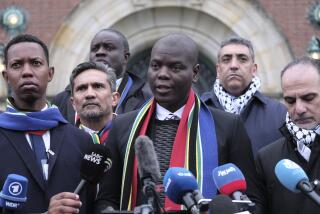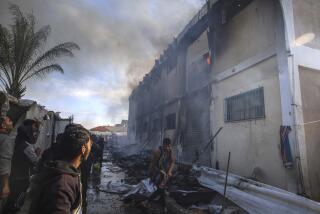Bosnian Serb Is Convicted of War Crimes
- Share via
THE HAGUE — In the first war-crimes judgment by an international court since Nuremberg, a tribunal Wednesday found a Bosnian Serb cafe owner guilty of crimes against humanity but acquitted him of murder and sexual mutilation.
The historic verdict was handed down by a three-judge panel after a yearlong trial, and it marked a milestone in the tormented effort to punish those who committed chilling atrocities during 3 1/2 years of war in Bosnia-Herzegovina.
Dusan Tadic, 41, was convicted for his role in the “ethnic cleansing” campaigns that characterized the war.
The International Criminal Tribunal for the Former Yugoslavia found Tadic guilty of the persecution, beating and torture of Muslim men and women, many of whom had been his neighbors before they were herded into prison camps during the 1992 Bosnian Serb takeover of northern Bosnia.
Tadic was cleared of 20 serious counts, including 13 murders, allegedly committed when he served as a part-time guard and police officer around the city of Prijedor. Three rape counts were dropped early in the trial because the alleged victim refused to testify, and charges involving up to 30 other murders were dropped when the key witness was found to be lying.
Tadic has maintained his innocence, saying he is a victim of mistaken identity.
Turning aside suggestions that they had failed to prove much of their case, prosecutors said they considered the pivotal conviction to be the persecution count.
In this ruling, the U.N. tribunal established that Tadic killed two Muslim police officers--although he was not found guilty of murder in those deaths--and committed other crimes as part of “widespread and systematic” discrimination based on race, religion and politics that was designed to rid the region of non-Serbs.
“It’s the heart of the Nuremberg conception of crimes against humanity,” Chief Prosecutor Louise Arbour said. “It captures perfectly adequately what we said was the true level of moral and legal culpability.”
Far more than Tadic’s fate was riding on Wednesday’s verdict. The future of the tribunal itself is in question as it struggles to build cases against war-crimes suspects who remain at large, flaunting their ability to elude attempts to bring them to justice.
“The record to date is one of considerable inertia by the international community,” Arbour said. “I’d like to think today will be a steppingstone to displacing some of that inertia.”
Others were less hopeful that the verdict will add momentum to the process.
In contrast to the World War II war-crimes prosecutions in Nuremberg and Tokyo, senior commanders are not on trial in the Netherlands proceedings. Of 74 indicted suspects, eight are in custody; by comparison, Tadic is small fry.
The most important figures, Bosnian Serb leader Radovan Karadzic and former army commander Gen. Ratko Mladic, have been indicted twice on genocide charges but have not been arrested.
Serbian President Slobodan Milosevic, widely regarded as the architect of the war, has not been indicted.
“This is an important first step, but not an adequate step. It is not anywhere near establishing justice for the terrible crimes committed in Bosnia,” Kenneth Roth, executive director of the New York-based Human Rights Watch, said of Wednesday’s verdict.
Tadic’s defense attorney, Milan Vujin, said he will appeal. The court has a special panel that hears appeals.
As the verdicts were read by presiding Judge Gabrielle Kirk McDonald, Tadic stood and jotted down notes. His face remained largely impassive, although he raised an eyebrow and sighed when McDonald remanded him back to the U.N. jail where he has been held since his arrest in Germany in 1994.
“He expected the court could decide the way it decided, but he’s not satisfied because he’s not guilty,” Vujin said in describing his client’s mood.
Tadic could have faced life in prison if he had been convicted of a murder charge. It is not clear now what his sentence will be, and one defense attorney suggested that it may not be much more than time served.
Sentencing is scheduled for July 1, but that could change during appeals.
Unlike Nuremberg, which sent 17 Nazi leaders to their deaths, the Hague tribunal is barred by its constitution from mandating capital punishment.
The prosecution is also expected to appeal.
The court, in a ruling with repercussions for future cases, said Tadic did not violate the Geneva Convention.
The tribunal threw out 11 counts alleging the “grave breach” of the 1949 Fourth Geneva Convention. Two judges ruled that it could not be applied in the Tadic case, and that Muslims could not be considered a protected class because the prosecution did not prove that the “ethnic cleansing” conducted by Tadic in the Prijedor area was directed by a foreign power--in this case, Serbia.
But Judge McDonald, who is American, dissented.
She said it was clear that the Bosnian Serb army was a proxy of the Yugoslav National Army, which paid the Bosnians’ salaries and handled their radio communications.
Arbour and other prosecutors said the court was setting an especially rigid standard of proof that will force future prosecutions to better establish the command-and-control links between Bosnian Serb and Croat armies, and their mentors in Belgrade and Zagreb, respectively.
The indictments against almost all other suspects include Geneva Convention charges, but crimes against humanity, genocide and other war crimes can be tried without applying the Geneva Convention breach, legal experts said.
The original indictment against Tadic, and the testimony that emerged in horrific detail during the appearances of 120 witnesses, were a litany of Bosnian wartime atrocities.
Human rights advocates said the tribunal’s split verdict showed that it was taking pains to be impartial. The Bosnian Serbs have routinely dismissed the court as a political farce, a position reiterated Wednesday on Bosnian Serb television and radio.
“It is a shame for the court that the most important witness was a false witness,” said Momcilo Krajisnik, the Bosnian Serb member of Bosnia’s three-person presidency, said, referring to the perjured testimony.
The Muslim-led government in Sarajevo expressed disappointment that Tadic was cleared of the murder counts.
“If more of his victims had survived, there would have been more [evidence], but unfortunately he was very efficient,” Bosnian government spokesman Mirza Hajric said.
The tribunal’s verdict Wednesday, contained in a 301-page opinion, was the first by a war-crimes court since the World War II trials.
In November, the tribunal accepted the confession of a 25-year-old Bosnian Croat, Drazen Erdemovic, who was a soldier in the Bosnian Serb army.
Pleading guilty to his role in the murder of 1,200 Muslims, Erdemovic was sentenced to 10 years in prison. No trial was held.
Also Wednesday, Ibrahim Djedovic, a member of Bosnia’s parliament, was arrested in connection with war-crimes investigations, Interior Minister Mehmed Zilic said.
Zilic said Djedovic was under detention in the parliament building.
A letter from the war-crimes tribunal to Bosnian officials in March led to Djedovic’s arrest, a statement by the Interior Ministry said. Quoting from the letter, the statement said there was sufficient evidence to treat Djedovic as a war-crimes suspect.
More to Read
Sign up for Essential California
The most important California stories and recommendations in your inbox every morning.
You may occasionally receive promotional content from the Los Angeles Times.










